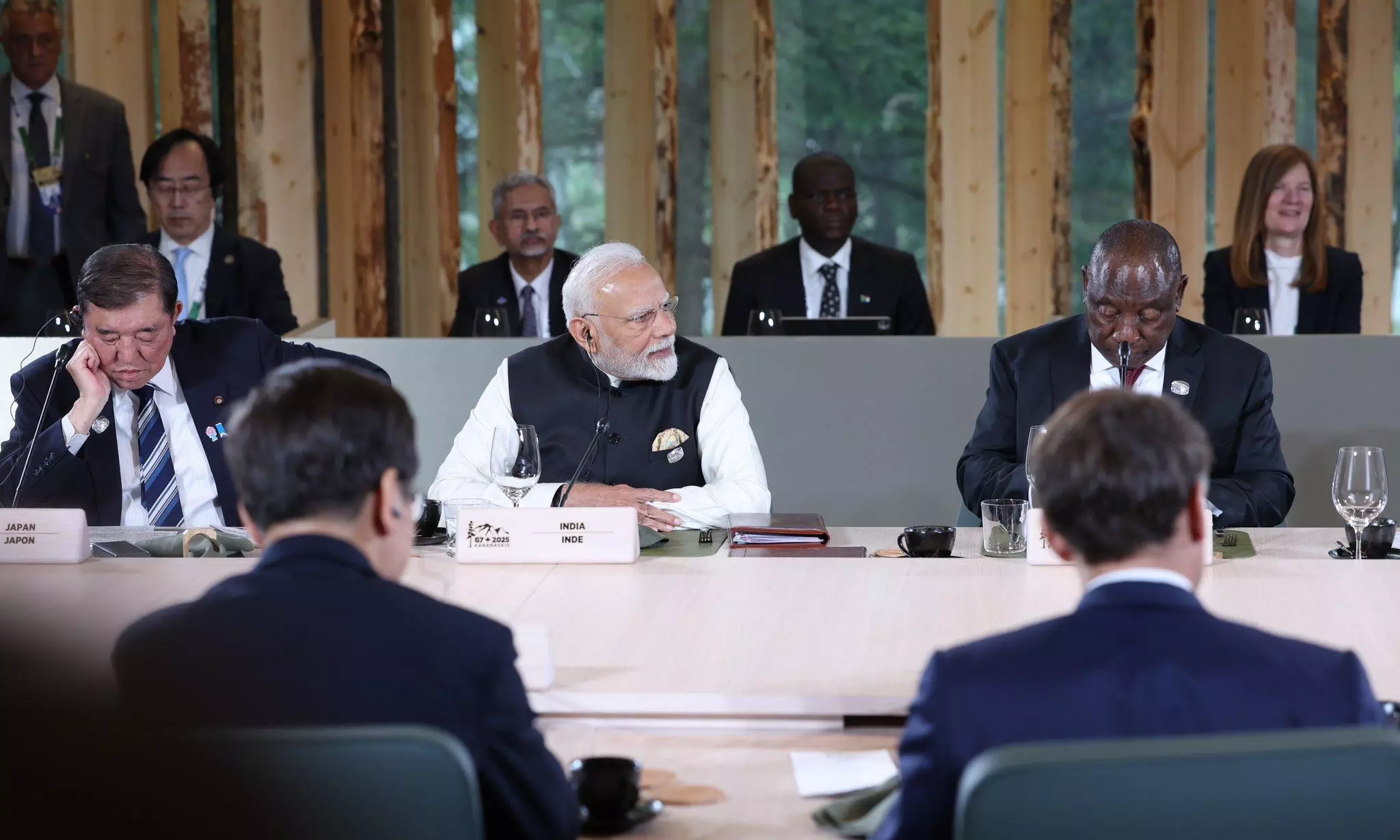G7 Summit: PM Modi Condemns Double Standards on Terrorism
Prime Minister Narendra Modi emphasised that countries backing terrorism must be held accountable

Prime Minister Narendra Modi in the Outreach Session on Energy Security at the 51st G7 Summit in Kananaskis, Canada. (Photo: X/@MEAIndia)
Prime Minister Narendra Modi, in a strong message to the global community at the G7 Outreach Session in Alberta, Canada, on Wednesday, condemned the double standards in dealing with terrorism. In a veiled reference to Pakistan and the selective stance of some G7 members, he criticised the practice of rewarding countries that support terrorism.
“I have some serious questions for those present in this room. Are we truly serious about addressing terrorism? Will we understand its true meaning only when it knocks on our own doors? Can those who spread terror and those who suffer from it be weighed on the same scale? Are our global institutions at risk of losing credibility?” the Prime Minister asked.
Calling for global accountability, he asserted, “If we don’t take decisive action against terrorism that threatens humanity, history will never forgive us. Turning a blind eye to terrorism for vested interests, or extending support to terror or terrorists, is a betrayal of all humanity.”
Although India is not a member of the G7, which includes Canada, France, Germany, Italy, Japan, the UK, and the US along with the European Union, Modi was invited for the seventh consecutive time as a special guest, reflecting India’s growing global influence.
In his address, Modi said, “There must be no place for double standards when it comes to terrorism.” Referring to the recent terrorist attack in Pahalgam on April 22, he said, “This was not just an assault on a town, but a direct attack on the soul, identity, and dignity of every Indian. It was an assault on all humanity.”
The Prime Minister expressed gratitude to those who condemned the attack and extended condolences, while stressing that terrorism is the enemy of democratic nations and humanity at large. “Unfortunately, our own neighborhood has become a breeding ground for terrorism,” he said.
He further noted, “Our policies must be clear, any country that supports terrorism must be held accountable. Sadly, we see the opposite. While some countries face sanctions, others that openly support terrorism are rewarded.”
Shifting focus to energy security and global conflicts, Modi said India views it as a responsibility to bring the concerns of the Global South to the international stage. “India has always acted in the interest of humanity, above self-interest. We follow a human-centric approach, technology must benefit even the last person,” he said.
He noted that countries in the Global South bear the brunt of global conflicts, facing crises in food, fuel, fertilisers, finance, and mobility. “As long as double standards exist, sustainable and inclusive development will remain out of reach,” Modi warned.
In a veiled reference to China, Modi added, “We must strengthen resilient supply chains and ensure they are not weaponized by any one country.”
In his second intervention at the session, Modi turned to Artificial Intelligence (AI), calling for international governance to address AI-related concerns while fostering innovation. “Only then can AI become a force for global good,” he said.
He proposed International AI governance to balance regulation with innovation, strong cooperation in critical minerals and technology, and mandatory watermarking and disclosure of AI-generated content to combat deep fakes.
"In the last century, we competed over energy. In this century, we must collaborate in technology," Modi said, inviting all nations to the AI Impact Summit in India next year.
Highlighting India’s strides in renewable energy, Modi said, “Ensuring energy security for future generations is our priority and responsibility.” He noted that nearly every Indian household now has electricity, and that India has one of the lowest per-unit power costs globally.
Despite being the world’s fastest-growing major economy, India has already fulfilled its Paris Climate Agreement commitments ahead of schedule. “We are on track to achieve Net Zero by 2070. Currently, renewable energy accounts for nearly 50 per cent of our total installed capacity,” he said.
India is focusing on green hydrogen, nuclear energy, ethanol blending, and smart grids. Modi cited global initiatives led by India, International Solar Alliance, Coalition for Disaster Resilient Infrastructure, Global Biofuels Alliance, Mission LiFE, and One Sun, One World, One Grid, as examples of India’s leadership in sustainable development.
Modi emphasised that while AI is a powerful enabler of innovation and efficiency, its energy-intensive nature necessitates a shift toward renewables. “AI’s real success lies in its ability to empower even the most marginalised. For instance, India’s AI-based language app ‘BHASHINI’ connects rural users with global languages,” he said.
He stressed the need for a human-centric approach to technology, noting that India's vast and diverse population provides a rich data foundation for inclusive and globally relevant AI models.
“India has built a robust data protection framework and a thriving talent pool committed to democratic values. Rich data is the foundation for inclusive, capable, and responsible AI,” he concluded.
( Source : Deccan Chronicle )
Next Story

